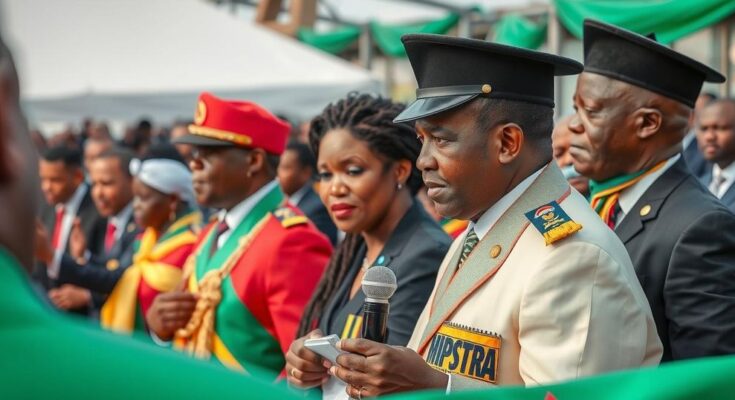Daniel Chapo was inaugurated as Mozambique’s president amidst protests from opposition leader Venancio Mondlane, who claims the election was fraudulent. There have been over 300 deaths linked to post-election violence, and international observers noted significant electoral irregularities. Civil society groups are urging the African Union not to recognize Chapo’s presidency, even as regional leaders attended the inauguration.
Daniel Chapo has formally begun his presidency in Mozambique, taking his oath of office amidst ongoing protests led by opposition leader Venancio Mondlane. Despite returning from self-imposed exile just days prior, Mondlane has called for a sustained campaign of protests against what he deems a fraudulent electoral process. The unrest has reportedly resulted in over 300 fatalities since the elections held on October 9, with both local and international observers noting significant irregularities during the electoral count.
The international community, particularly the European Union, has expressed concerns regarding the election’s integrity, with reports of vote counting irregularities and unexplained modifications to election results. In light of these issues, organizations such as the Pan-African Lawyers Union are advocating for the African Union to disregard Chapo’s presidency. Nonetheless, regional leaders, including Cyril Ramaphosa of South Africa and Umaro Sissoco Embalo of Guinea-Bissau, attended the inauguration ceremony in Maputo, highlighting a divided response to Chapo’s ascension.
In his inaugural speech, President Chapo emphasized the need for stability and collective efforts towards the development of Mozambique, seeking unity among the citizens despite the prevailing tensions. Unlike the calls for daily protests by Mondlane, Chapo’s vision focuses on collaborative progress, reflecting a significant divergence in political strategies amid the discord.
The political landscape in Mozambique has been tumultuous following the recent elections, which have been marred by allegations of fraud and violence. The opposition, particularly represented by Venancio Mondlane and his party, has been vocal about their discontent, claiming that the electoral process was manipulated. The unrest, which has resulted in numerous casualties, underscores the contentious relationship between the governing body and opposition forces, marking a critical moment in Mozambique’s democratic evolution.
In summary, Daniel Chapo’s inauguration as President of Mozambique has ignited widespread protests and underlined significant political fractures within the nation. Opposition leaders and civil society argue for a reevaluation of the election’s legitimacy, while Chapo calls for unity and development. The future of Mozambique’s political stability remains uncertain, as diametrically opposed visions for the country’s direction clash amidst civil unrest.
Original Source: www.dw.com




